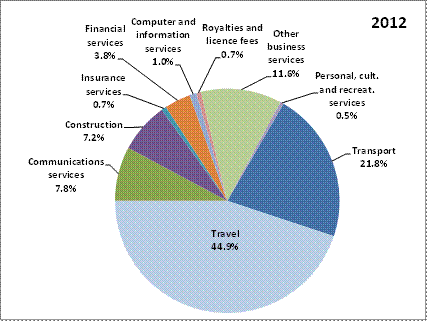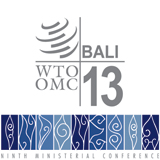9TH WTO MINISTERIAL CONFERENCE, BALI, 2013
Briefing note: Decisions for least-developed countries
Least-developed countries (LDCs) are the poorest members of the world community. They comprise about 12 per cent of the world's population but account for less than 2 per cent of world GDP and about 1 per cent of global trade in goods. Their participation in global trade in services is even less.
Updated: November 2013
THIS EXPLANATION is designed to help the public understand developments in the WTO. While every effort has been made to ensure the contents are accurate, it does not prejudice member governments’ positions.
> Ministerial Conferences
> Bali Ministerial Conference
> Other briefing notes
Among the 49 LDCs designated by the United Nations, 34 have become WTO members (see list) while another nine are negotiating to join the WTO.
WTO members recognize that LDCs need special treatment and assistance to achieve their development objectives. WTO agreements include provisions aimed at increasing LDCs’ trade opportunities and allowing LDCs flexibility in implementing WTO rules. The WTO together with other international agencies have also established special programs to support LDCs in enhancing their participation in the global trading system.
It is expected that Ministers will be asked to adopt decisions concerning LDCs at the Ninth WTO Ministerial Conference on 3-6 December 2013 in Bali. These decisions result from the proposals made by the group of LDCs (TN/C/W/63; TN/C/W/63/Add.1; TN/C/W/63/Add.2 and TN/AG/GEN/33). The proposal contains four major elements:
- a decision on the implementation of duty-free and quota-free market access for LDCs
- a decision on preferential rules of origin for LDCs
- a decision on the operationalization of the LDC services waiver
- a decision in the area of cotton, covering both trade and development assistance aspects.
In addition, a revised WTO Work Programme for the LDCs (WT/COMTD/LDC/11/Rev.1), initially drawn up in 2002, was agreed by WTO members in June 2013. The Programme looks at systemic issues of interest to LDCs in the multilateral trading system. Also a decision to strengthen the accession guidelines of LDCs, which were adopted in 2002, was approved by WTO members in July 2012.
Duty-free and quota-free market access for LDCs
In the 2005 Hong Kong Ministerial Conference, members adopted a Decision on Measures in Favour of Least Developed Countries where developed countries, and developing-country members declaring themselves in a position to do so, agreed to implement duty-free and quota-free (DFQF) market access for products originating from LDCs.
Since the adoption of the Hong Kong Decision, members have made significant progress towards the goal of providing DFQF market access on a lasting basis for all products originating from all LDCs. Nearly all developed-country members provide either full or nearly full DFQF market access, and a number of developing-country members also grant a significant degree of DFQF market access to LDC products.
At the December 2013 Bali Conference, Ministers will consider a draft decision that would further encourage developed-country members to improve their existing DFQF coverage for products originating from LDCs, so as to provide greater market access to LDCs. The text also encourages developing-country members, declaring themselves in a position to do so, to provide DFQF market access for products originating from LDCs, or to improve their existing DFQF coverage for such products. The draft decision instructs members to report on the implementation of this decision at the next WTO Ministerial Conference in 2015.
The draft decision represents a political commitment of WTO members to assist LDCs to integrate into the multilateral trading system. It also calls on WTO members to enhance the transparency of the duty-free and quota-free schemes. WTO members would notify their DFQF schemes to the WTO, and the relevant WTO committee would annually review the steps taken to provide the duty-free and quota-free market access to LDCs.
To aid in its review, the WTO secretariat would prepare a report on Members’ duty-free and quota-free market access for LDCs at the tariff line level in close coordination with Members based on their notifications.
Draft decision on preferential rules of origin for LDCs
A draft decision on preferential rules of origin applicable to imports from least-developed countries is being submitted to Ministers at the WTO Ministerial Conference in Bali for its adoption.
Rules of origin are the criteria used to determine where a product was made. Products that are deemed under such rules to be made in LDCs would qualify for preferential market access schemes for LDCs. In other words, rules of origin are used to ensure that only products originating in LDCs benefit from the trade preferences that have been afforded to them.
The draft decision contains a set of multilateral guidelines for the rules of origin that WTO members apply to their non-reciprocal preference schemes for LDCs. For the first time, governments will have a set of multilaterally agreed guidelines, which should help make it easier for LDC exports to qualify for preferential market access. The draft decision recognizes that each country granting trade preferences to LDCs has its own method of determining rules of origin, and it invites members to draw upon the elements contained in the decision when they develop or build on their individual rules of origin arrangements applicable for LDCs.
The guidelines recommend that preferential rules of origin and the related documentary requirements should be as transparent and simple as possible. For this purpose, the decision recognizes ways in which origin can be conferred and provides some illustrations in which preferential rules of origin can be made easier to comply with.
The decision also requires that members notify their preferential rules of origin for LDCs to the WTO to enhance transparency, make the rules better understood, and promote an exchange of experiences as well as mainstreaming of best practices. The WTO's relevant bodies shall also annually review these rules of origin.
Draft decision on the operationalization of the LDC services waiver
A decision to promote the granting of preferences to LDCs under the LDC services waiver is being submitted to Ministers at the WTO Ministerial Conference in Bali for its adoption.
The decision aims to increase the participation of LDCs in world services trade, resulting in benefits that can help achieve development objectives.
Trade in services plays an increasingly important role in global trade. It accounts for over 70 per cent of the world's GDP, 45 per cent of the world's employment and around 40 per cent of the world's stock of foreign direct investment. However, the participation of LDCs in world trade of commercial services remains marginal – it accounts for about 0.6 per cent of exports and 1.7 per cent of imports of these services, according to a study by the WTO Secretariat.
LDCs' structure of commercial services by sector, 2012
(percentage)

Source:WTO and UNCTAD Secretariat estimates.
The WTO's Eighth Ministerial Conference in December 2011 adopted a decision on a “services waiver”, allowing WTO members to provide preferential treatment to services and services suppliers of LDCs. This waiver decision, however, does not guarantee that members actually grant preferences to LDCs. The draft decision notes that no WTO member has yet made use of the services waiver since its adoption in 2011. It also recognizes the need to strengthen LDCs' domestic services capacity in order to make use of existing opportunities as well as any preferences afforded to them.
According to the draft decision, Ministers will instruct the Council for Trade in Services to initiate a process aimed at promoting the expeditious and effective operationalization of the LDC services waiver. As part of this process, a high-level meeting is foreseen six months after the LDCs will have tabled their collective request identifying their sectors and modes of supply of export interest to them. Members are also encouraged at any time to extend preferences to LDCs' services and service suppliers, consistent with the waiver decision.
The draft decision also underlines the importance of enhanced technical assistance and capacity building to help LDCs benefit from the operationalization of the waiver.
Cotton
Based on a proposal that the Cotton-4 countries — Benin, Burkina Faso, Chad and Mali — submitted in October 2013, WTO members agreed on a draft decision focusing on both the trade and development aspects of the cotton issue.
The draft decision reiterates members’ commitment to “on-going dialogue and engagement” to make progress in the negotiations on cotton according to the 2005 objectives, which were agreed at the Hong Kong Ministerial Conference. The draft also says members will meet twice each year to study the latest information and to discuss the latest developments on market access, domestic support and export subsidies for cotton, particularly from LDCs. These sessions will come under the agriculture negotiations.
For more information, see a separate briefing note on cotton negotiations.
Streamlined accession for the poorest countries
A decision to facilitate and accelerate the accession process for LDCs was formally approved by WTO members at the General Council on 25 July 2012. The decision strengthens the LDC accession guidelines adopted by members in 2002. The 2012 strengthened guidelines introduce precise flexibilities and parameters to help LDCs accede to the WTO at a pace and in a manner consistent with their development, trade and financial needs. The decision contains five key elements:
- benchmarks on goods
- benchmarks on services
- transparency in accession negotiations
- special and differential treatment and transition periods
- technical assistance.
Find out more on the LDC accessions decisions, also contained in document WT/L/508/Add 1
Find out more
Review of market access for LDCs: WT/COMTD/LDC/W/58
Sub-Committee on Least-Developed Countries
Enhanced Integrated Framework for LDCs
